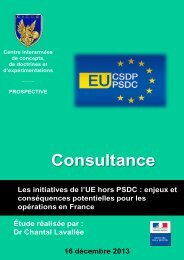Conference
science-research-bulletin-2013-conference
science-research-bulletin-2013-conference
Create successful ePaper yourself
Turn your PDF publications into a flip-book with our unique Google optimized e-Paper software.
EUROPEAN POLICE SCIENCE AND RESEARCH BULLETIN<br />
SPECIAL CONFERENCE EDITION<br />
WHY TRUST IN THE POLICE VARIES BETWEEN<br />
EUROPEAN COUNTRIES<br />
Juha Kääriäinen<br />
Finland<br />
Keywords: trust in the police, welfare state, social capital, quality if government<br />
Abstract: Trust in the police varies a lot across European countries. In this paper it is asked, why is that,<br />
what are the reasons for those big differences between European countries.<br />
Research literature approaches people’s trust<br />
in the police mainly from the perspectives of<br />
efficiency and fairness of police activities. In<br />
other words, variation in trust is analysed in<br />
terms of the function of efficiency, justness<br />
or fairness in policing. However, the countrylevel<br />
differences cannot be deduced from the<br />
individual level findings: societies are different<br />
as societies, not just as a composition of<br />
different individuals and their experiences.<br />
In this presentation, which is based on the<br />
data of the European Social Survey and some<br />
other sources in 16 European countries, three<br />
potential country-level explanations for the<br />
country-level variation of the trust in the police<br />
are given. Multilevel models are not included. It<br />
seems that the high level of trust in the police is<br />
in connection with 1) high welfare spending, 2)<br />
high quality of governance and 3) high level of<br />
social capital.<br />
1. INTRODUCTION<br />
In democratic societies, the citizens must be<br />
able to trust the police, because the police have<br />
been granted extensive authority to control,<br />
monitor or even directly punish citizens for<br />
undesirable behaviour. Citizens must be able<br />
to trust that the police use this authority in<br />
accordance with the democratically enacted<br />
laws and decrees. On the other hand, citizens<br />
simply expect police to provide results: the<br />
police must ensure the safety of the citizens by<br />
preventing crime, solving suspected crimes,<br />
and promoting general safety and order in<br />
other ways. In fact, these are the two points<br />
of view used in studying the trust of citizens in<br />
the police: instrumental and procedural. The<br />
instrumental approach studies trust from the<br />
point of view of the effectiveness and impact of<br />
the activities of the police, and the procedural<br />
approach uses the point of view of the methods<br />
used by the police. Citizens expect the police<br />
to act efficiently, but also equitably and in an<br />
ethically acceptable manner (see e.g. Tyler &<br />
Huo, 2002).<br />
The trust of the citizens in the police can<br />
therefore be considered important for<br />
democracy and civil rights. In addition, the trust<br />
is thought to improve the cooperation between<br />
the citizens and the authorities. Police activity<br />
cannot be efficient without the support of the<br />
citizens. Trust increases law-abiding behaviour<br />
and promotes the exposure of crimes and their<br />
resolution (Sunshine & Tyler, 2003; Jackson &<br />
Bradford, 2009).<br />
How much do the citizens trust the police,<br />
then? We have data from several international<br />
surveys, which we can use to make fairly reliable<br />
observations. One of the best European projects<br />
is the European Social Survey, which has been<br />
conducted since 2002 and is repeated regularly<br />
every other year. Almost all countries currently<br />
in the EU have participated in the survey, as well<br />
as several other European countries. The survey<br />
material is mainly collected via interviews<br />
during personal visits. From its inception, the<br />
survey has also included a question on the trust<br />
91





